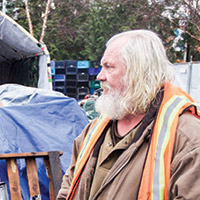What causes someone to live on the streets?
Consider a story about one man who was unable to work because he had severe arthritis in both hips. The man couldn’t pay rent and had nowhere to go. A hip replacement would have put him back to work, but the surgeon would only operate if the man had a place where he could recover.

“He was caught in a terrible catch-22,” says Sara Marquis, an MPH student in the Department of Health Services, “unable to afford housing due to an illness beyond his control and unable to receive treatment due to his lack of stable housing.”
The lesson is that a few unfortunate circumstances can make or keep someone homeless, says Marquis, who works with University District Street Medicine. Other SPH students gained similar insights this winter when nearly 60 homeless individuals moved to campus as part of Tent City 3. Several students, including Marquis, learned to engage tent city residents around their health care needs in UW’s first course on homelessness. Through UW Medicine’s MEDEX Northwest, students explored factors such as domestic violence, mental health, drug use and debt.
“Medical debt of $150 was enough to create housing instability and ruin credit scores for some,” says Jessica Bielenberg, an MPH student researching homelessness and medical debt for her thesis. She collaborated with Tent City 3 and Nickelsville residents to design a survey and gather stories about financial hardship and health care.
“I was nervous,” Bielenberg says. “But I was able to build relationships and listen, and engage them to be part of the solution.”
Bielenberg and eight other students from the Community-Oriented Public Health Practice (COPHP) program took the same approach while conducting the UW’s formal evaluation of Tent City 3. As part of a course on program evaluation taught by COPHP Director Amy Hagopian, students assessed questionnaires, held focus groups and conducted interviews to evaluate whether the tent city achieved its goals.
Students found that 90 percent of residents were satisfied with their stay and all felt safe. Most in the UW community viewed the stay as positive and 61 percent of students, faculty and staff said the UW should host again.
“Homelessness is a serious public health issue,” says MPH student Hena Parveen, who was part of the evaluation team. “I wasn’t able to relate to homelessness until I worked on this project. It’s a step to start meeting them where they are.”
